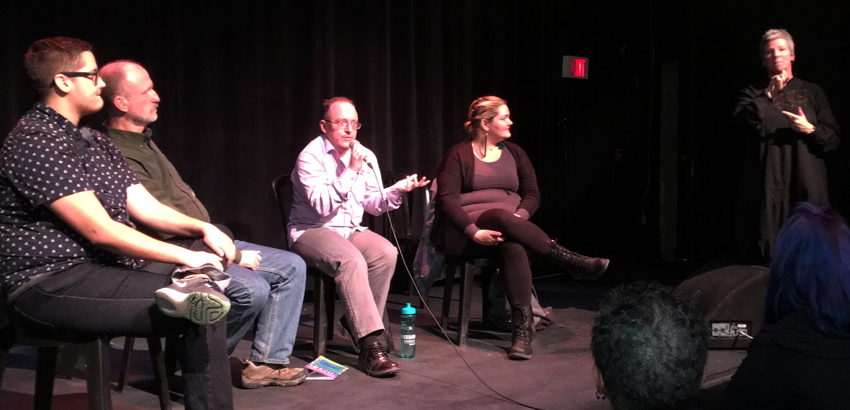I see now it was back in November 2016 that I attended a panel discussion at Buddies about deaf “queer” writers.

Apart from Raymond Luczak (second from left), a known name and an author or editor of a frankly staggering number of titles, everybody else on the panel was some kind of weird genderqueer or whatever – at least according to their online descriptions. But since these mild-mannered writers weren’t threating to cut my head off, incite a riot against me, or even cut my mike, it was fine to be in their presence. (It was part of the “LGBT+” Naked Heart literary festival, which has had nothing to commend it before or since.)
I was surprised to learn how much I learned. The first lesson came from Luczak, or rather from his œuvre: Keep writing and editing even if it doesn’t pay, because time will pass and you may accumulate an enormous catalogue. You’d think I’d know that already. I do, but then there’s living it.
The next came from the cartoonist on the panel (at left). Now, there’s a way to go to vocational school and still end up not making money. But if that ever occurred to him, that would be among the many deterrents he ignores completely. This fellow has an unremittingly positive outlook that translates even to his signing style, which takes up lots of space.
Underlying everything was a generational divide that is so passé it wasn’t even mentioned: These are all deaf writers, meaning they are dedicated to self-expression using English rather than ASL. Circa 1989 there would have been a movement at Gallaudet protesting the imperialist hegemony of the hearing language – even while people like me worked to ensure deaf people had access to English-language television and cinema and even as deaf people had, since time immemorial, used English to communicate when not in proximity.
“Bi‑bi” has been a buzzword among deaf (“Deaf”) persons for enough generations that it seems now everyone actually is bilingual/bicultural.
If these kids (Luczak isn’t a kid anymore) can be that positive, again, you’d think I could. As in Bill Buxton’s experience, sometimes olds need to learn from the young.
Sadly, the interpreting was severely mishandled. One panellist was hard-of-hearing and could speak, but was not simply handed the spare microphone that sat forlornly on a stand for the whole event. (I’d pointed it out to the organizeuse in advance.) Raymond Luczak’s service dog was constantly in the way of an interpretrix as she moved from front-row audience to stage, and she had to hike up her insanely overlong skirt to get over that dog. A simple swap of seats would have solved that problem. A service dog can handle moving over one seat.
There was no way to interrupt the proceedings and explain they were constantly interrupting their own proceedings. But they were.
I’ve been dealing with interpreters of many stripes since the previous century, and there has to be room for the audience to pause the show and get problems solved. (Then there was that time the acoustics were so bad in a meeting room that I had to sit directly next to the student interpretrix just to hear what she said. And my hearing is fine.)
As at all these events, I understood one word out of 300. But unlike at other events, I didn’t mutter helpful corrections to the interpreters.